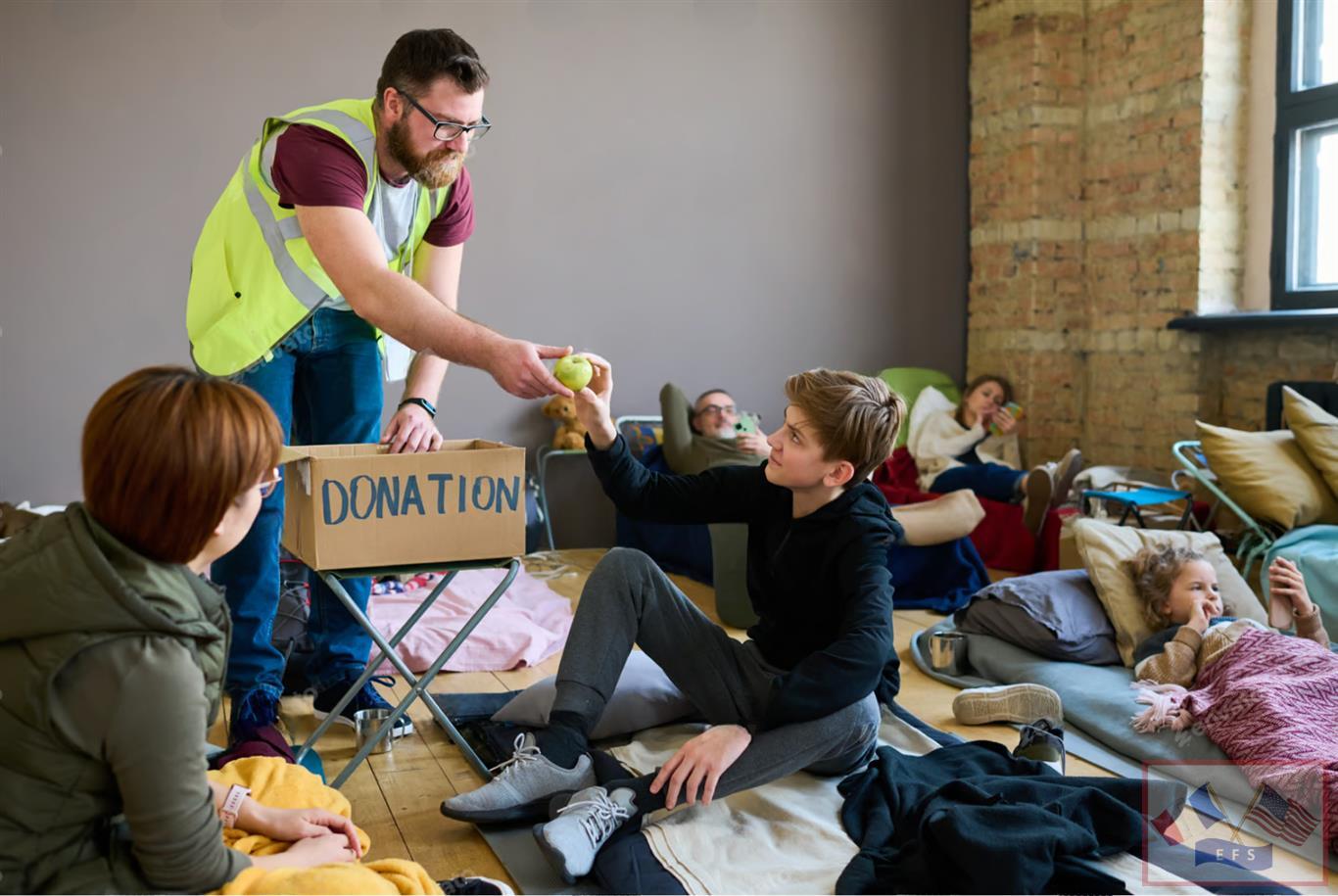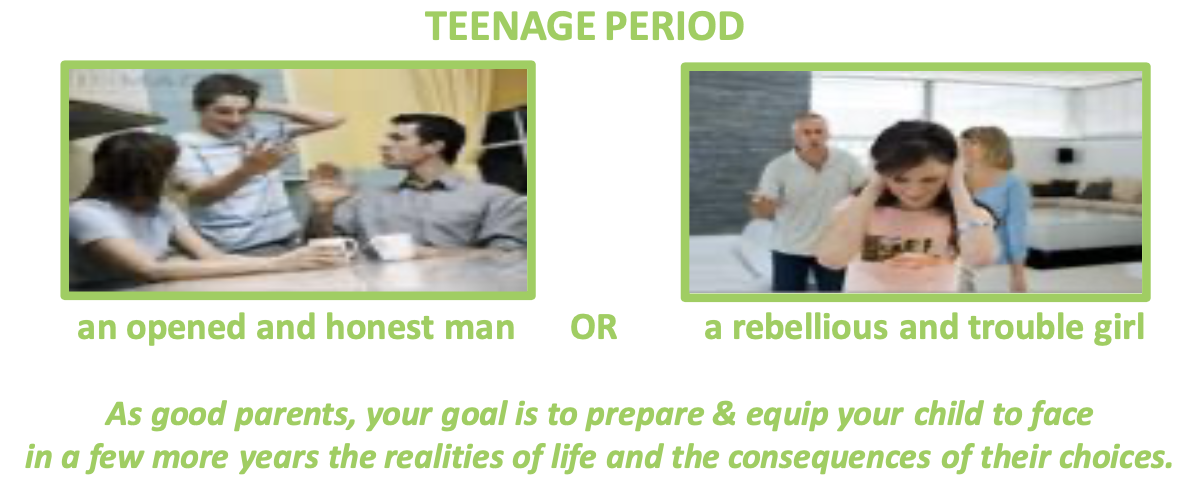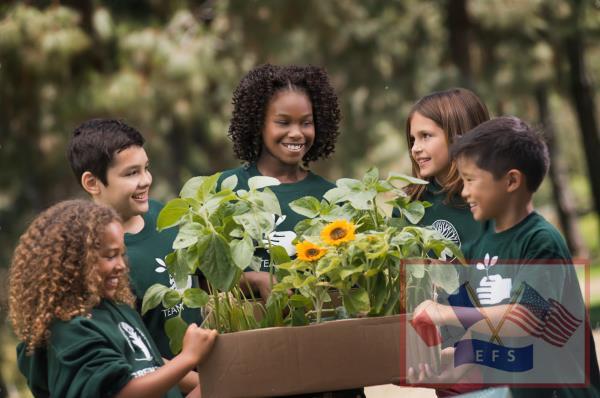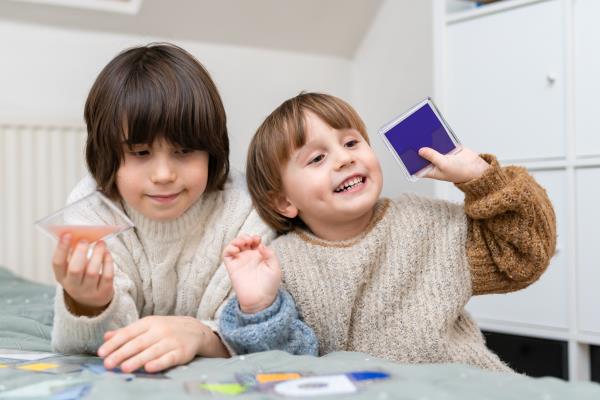TEACHING GOOD VALUES

TEACHING GOOD VALUES
From 7 to 12: it is the period, when your child will be the most receptive to all teachings.
As he can understand & think in a deeper way.

It is very important that, you answer his questions, in an accurate way.
Don’t ignore them, nor should you hide any truth about realities of life.

TEACH HIM GOOD VALUES: so he can build his inner-being & gain a good behavior.
1. TO NOT LIE: explain to him, that a lie will make someone else pay, for his own mistakes.
Ask him, if he would be happy if he is punished, for someone else’s wrong doing?
People understand better when we put them in a same situation.
2. TO SAY SORRY: after realizing our wrong doing, to say sorry to the one, we have wronged or hurt, helps the broken relationship, to heal & to start over again.
You must start this, since your child was a toddler.
3. TO NOT STEAL: a child is in the process, to discover many things, that attract him.
• So when he can’t get them, he is tempted to take it & to bring it home. It is STEALING.
Teach him: to ask first if he can take it home and if he can not get it, he must not take it home, because it is a very bad action and the Police can catch him.
• Even, young children are scared to be caught by the Police.
Ask him if he would be happy if a friend takes away, his toys? So he can feel, this wrong doing.
Once they felt their loss, they won’t do it.
4. TO NOT CHEAT: it starts at school, during a test. He may copy his classmate’s test, to get a good mark or when he will fail following, the rules of a game, to win. It is cheating.
• Explain to him, that it is not fair & later, no one will want to play with him, if he doesn’t follow the rules of a game and cheat.
Ask him if he likes, when one of his friends, cheat during a game to win?
Once he said NO he won’t be happy, he will realize it and will stop cheating.
5. TO NOT BEAT OTHERS: especially the weaker (younger kids, girls, old people, or pets).
• Explain to him, that it is a very coward act, to use his strength to hurt someone weaker than him.
Ask him how would he feel, if one of his friend who is bigger hits him? So he can feel it.
• Also, if they have equal strength, he must not fight but solve the issue, by talking to each other.
• Explain that, we are humans & not beasts, who fight because they can’t speak or think.
But we have the power of speech & a mind, to think and solve conflicts.
• Tell him the serious consequences of physical violence: injuries, paralysis or death for the victims and jails for the abusers.
For these 2 parties, it will only bring destruction & pains.
An abused child will become in most cases, an adult abuser.
6. TO NOT TOUCH CIGARETTES OR ALCOHOL: they are the 2 greatest causes of cancer & death.
• Explain to him & show him pictures of smokers' lungs or cancer throats so he can realize the seriousness of these 2 main addictions.
• Also, a drunkard can kill others’ lives while driving. He will end up in jail & takes someone’s life because, alcohol makes people lose their self control.
7. TO NOT TOUCH ANY DRUGS:
• Show him pictures or videos of addicted people, whose lives & futures are doomed to sufferings and shame.
8. TO NOT HAVE SEX until they meet the right person:
• Show them pictures or videos of pregnant teens who have to abort (kill their babies) or
• abandon them or ruin their futures, because they can no longer, study but work to feed their babies.
Explain the consequences & ask him, how he would feel in that situation?
• To help him realize & make his own decisions.
TEENAGE
From 11 to 20: that everyone has to go through, this 2nd period of cutting himself from their parents’ personalities, to find his own:
• Your child will stop sharing with you, as his role model but will follow his peers.
For some, it starts at 11 and others, at 20 or even older.
• The 1st stage was the toddler’s NO period.
• The teenage is even more violent, sometimes because of the hormones raising, in his body.
HOW TO FACE AND HANDLE, THIS TEENAGE PERIOD?
During this time, not only, will your sweet child say NO to you, but his actions will show you, his oppositions to the rules, you have set, in the past.
• Teenage girls will oppose and challenge, their moms’ personalities and push the established boundaries
• Teenage boys will challenge authorities, at school or at sports clubs and oppose his parents’ boundaries and rules, to prove that, they are no more a boy but adults.
• But even, they may want to get out of their parents’ protections and boundaries, but we know, they are still lacking of life experience.
TEENAGE PERIOD
HOW TO HANDLE, THIS VERY DIFFICULT TEENAGE-TIME?
• If you have build, daily conversations and care with your teen child from infancy, it will help you know what is in his mind and life.
LISTEN to your teen’s days events & comments: Hold your comments or advices.
• Let him tell you, about his day & comments.
• Pick the most important & urgent matter in all the things, he may have told you & discuss with him about this matter, like a friend.
You can not act, like a parent anymore, but you must act like a friend.
WHAT DOES IT MEAN TO BE HIS FRIEND?
• Until now, you could as a parent, use your authority, to give your point of views and give instructions. Your child admired you and listened to you.
But when your child is in his teenage (age of rebellion & oppositions) you can only ask questions, to get him, to analyze his thinking or actions, bringing him, to make the right decisions.
• If he sees in you, the authority, the parent, he will oppose you for the sake of challenging your authority, as a parent or he will shut down all conversations and go into his room.
• The difficult work for you, is to keep the communication running, between you and your teen. Be aware he will not spend, as much time with you, as before.
• But if you can have a conversation, with him about his day, it will be very good, so you can know what is going on in his mind and life.
You must be a friend. It means you must show more understanding & tolerance.
TO WHAT EXTEND, AS A PARENT CAN YOU ALLOW YOUR TEEN TO GO?
• You will have to allow your teen, to go to his friends’ places or to hang out more, outside, so:
Work together, on a new time-table about, his leisure schedule, to not mess up with his studies.
• You must trade his time-out, with his time to study and be at home. Trade with the activities he
likes to bring him to do, what is important: his studies & his time, with his family.
Example: If you study well and come home, on time for dinner, you can go to Basket ball.
• You may invite his friends over, to avoid him to be all the time, outside: Provide them with drinks, snacks and games.
• You will have to be opened, for him, to date someone (it’s better to know, who he is in love with and what their intentions are: to avoid dramas, abortions or their baby’s abandonment).
Negotiations & trading are the best ways to deal with a teen.
UNDERSTANDING TEEN’S MINDS
• Everything, you have taught your teen may be, put on hold, in his memory during this teenage, that’s why you must act, like a friend, to know daily, what is going on, in his life.
• Know, that he will be under the pressure, to follow his friends and to conform to the adults’ world because he thinks, he is an adult (opened to alcohol, cigarettes, drugs, sex, exciting & risky adventures).
• If you say NO to his driven desires, to live like an adult, he may run away or stop communicating with you and you will lose your child and expose him, to all the dangers surrounding him.
That’s why communication is the only link that will tie him, to you.
The goal of all of your tolerances is, to know what your teen is doing and to keep protecting him from all the temptations & outside dangers.
From alcohol, cigarettes, drugs, pregnancy, accidents, rapes, kidnappings and robberies…
MINIMIZE YOUR TEEN’S RISKS & DANGERS:
• You must get from your teen that, he knows, you care for him.
• You must get the information, regarding his schedules & moves (addresses where he goes).
• Equip him with a phone & credit, to contact him.
• You must get who he is seeing.
All these information, will allow you, to protect him, in case something happens: you will be able to retrace his moves.
You can no more be a parent but you must become a friend.
• Better knowing what mistakes, he is planning to do than to discover them, once it is done.
You can no more say NO but you must find something to trade with him.
The goal of all of your tolerances is, to know what your teen is doing and to keep protecting him from all the temptations & outside dangers.
From alcohol, cigarettes, drugs, pregnancy, accidents, rapes, kidnappings and robberies…
HOW TO PREPARE YOUR TEEN, to all the dangers of the adults’ world?
• When your child was old enough, to understand from 7 to 10 years old:
• Tell him about all the destructive sides of alcohol, drugs, sex and addictions.
WHAT WILL KEEP YOUR TEEN, TO DO THE WORST?
• When the teen time comes, you can’t do much. The only thing that may keep him from making the big mistakes of his life is everything you have taught him.
A deep relationship (built since his childhood) with you, his parents.
• Keep the hope that your teen will overcome this dangerous stage and everything, you have taught him, since his childhood will bring him back to you and that, he will learn from his mistakes
To become the man or woman, you have invested in, since he or she was born, because you care for your child and worked hard, to be a good parent.





























